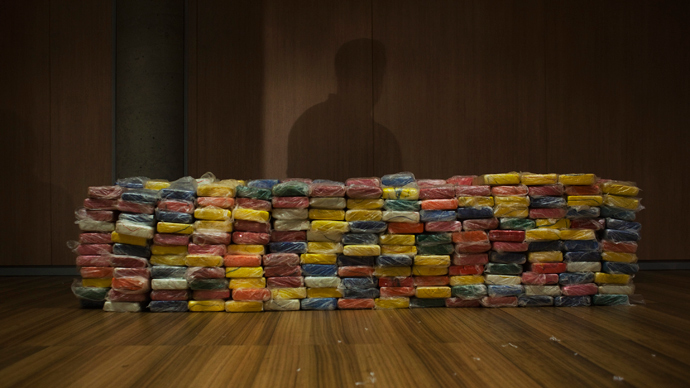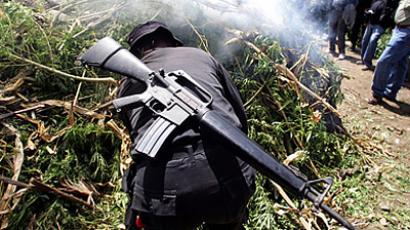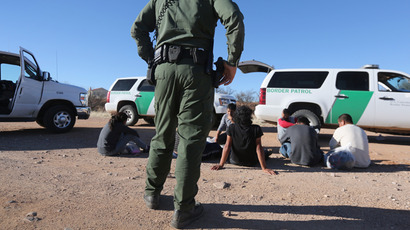US govt struck deal with Mexican drug cartel in exchange for info - report

Between 2000 and 2012, the US government had a deal with Mexican drug cartel Sinaloa that allowed the group to smuggle billion of dollars of drugs in return for information on its rival cartels, according to court documents published by El Universal.
Written statements made by a Drug Enforcement Administration (DEA) agent and a US Department of Justice official in US District Court of Chicago following the 2009 arrest of Jesus Vicente Zambada-Niebla - son of a Sinaloa leader Ismael “El Mayo” Zambada and the organization’s alleged “logistics coordinator" - indicate that DEA agents met with top Sinaloa officials over 50 times beginning in 2000.
"The DEA agents met with members of the cartel in Mexico to obtain information about their rivals and simultaneously built a network of informants who sign drug cooperation agreements, subject to results, to enable them to obtain future benefits, including cancellation of charges in the US," El Universal reported.
DEA agent Manuel Castanon told the court, "On March 17, 2009, I met for approximately 30 minutes in a hotel room in Mexico City with Vincente Zambada-Niebla and two other individuals — DEA agent David Herrod and a cooperating source [Sinaloa lawyer Loya Castro] with whom I had worked since 2005. ... I did all of the talking on behalf of [the] DEA."
Hours later, Mexican Marines arrested Zambada-Niebla - known as “El Vicentillo” - for trafficking billions of dollars of cocaine and heroin. Castanon and other DEA agents later visited Zambada-Niebla in prison, where he “reiterated his desire to cooperate.”
Patrick Hearn, a Justice Department prosecutor at the time, told the US District Court that, according to DEA special agent Steve Fraga, Sinaloa lawyer Castro offered information leading to a 23-ton cocaine seizure, other seizures related to "various drug trafficking organizations," and that “El Mayo” Zambada requested his son cooperate with US officials.
Zambada-Niebla’s attorney told the court that Castro negotiated a deal with US agents in the late 1990s that ensured Sinaloa would filter information on rival drug trafficking operations if the US would dismiss its case against the Sinaloa lawyer and withhold interference in Sinaloa’s trafficking actions or stop actively prosecuting Sinaloa’s top officials.
"The agents stated that this arrangement had been approved by high-ranking officials and federal prosecutors," Zambada-Niebla lawyer wrote to the court.
Upon extradition to Chicago in early 2010, Zambada-Niebla claimed he was "immune from arrest or prosecution" given his cooperation with US federal law enforcement.
El Universal, of Mexico, is the first news outlet to publish the documents. Its investigation included interviews with over 100 active and retired police officers, in addition to prisoners and experts. The DEA did not comment for the story.
The news daily reported that the US-Sinaloa relationship peaked between 2006 and 2012, as multiple cartels tightened their grip in Mexico. El Universal says it is unclear if any similar deals exist today.
The revelations follow years of allegations that Joaquin “El Chapo” Guzman, leader of Sinaloa and considered one of the world’s most powerful drug traffickers, had coordinated with US authorities.
Sinaloa has a formidable presence in the US. For example, the DEA has said the cartel supplies 80 percent of the heroin, cocaine, marijuana and methamphetamine - worth US$3 billion - that enters the Chicago area per year.
Zambada-Niebla has also alleged that Operation Fast and Furious was an agreement with the US to finance and arm Sinaloa in return for information on rivals. The gun-walking scandal, dubbed Operation Fast and Furious, involved the US Bureau of Alcohol, Tobacco, Firearms and Explosives deliberately allowing licensed firearms dealers to sell weapons to illegal buyers. The ATF allegedly planned to track the guns to Mexican drug cartels for later arrest.














